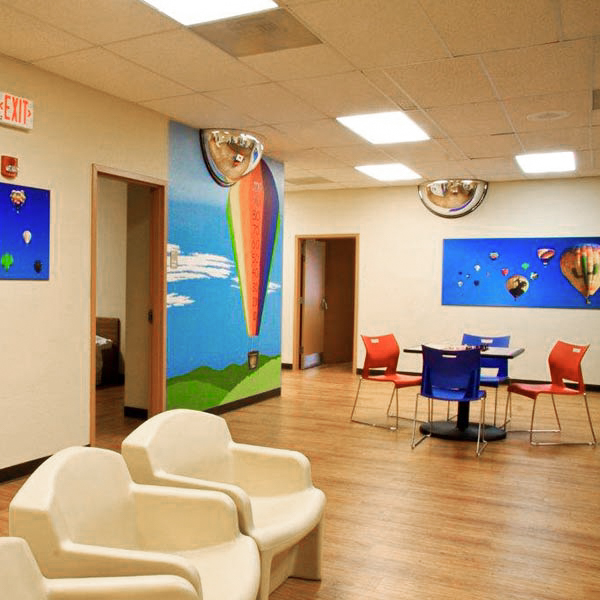Sonora Behavioral Health Hospital is dedicated to providing superior treatment to children, teens, and adults suffering from depression. Located in Tucson, Sonora provides the comprehensive care needed to successfully manage mental health disorders and lead a life of recovery.
Treatment for Depression
Learn More About Treatment for Depression
Depression is defined as a mood disorder that causes persistent feelings of sadness as well as a loss of interest in the world around you. Also referred to as major depressive disorder, this mental health illness affects how an individual thinks, feels, and acts. Additionally, depression can lead to the development of a number of emotional and physical problems that can disrupt functioning on a day-to-day basis.
Sonora Behavioral Health Hospital is a 140-bed acute inpatient psychiatric hospital that is designed to treat behavioral health and, drug & alcohol addiction, chemical dependency issues affecting children, adolescents, and adults. The staff here at Sonora wants you to know that despite possibly feeling as though you are never going to escape the dark cloud of depression, even the most severe symptoms can be treated. We can provide you with a number of treatment methods that will help you learn the skills needed to beat your depression and get the life you have always wanted.
Helping a Loved One
Helping a Loved One or Family Member Get Treatment
Not only is depression a difficult time for the afflicted individual, but it also impacts the people that are close to the person as well. Since individuals who are depressed often give off signals that they want space or to be left alone, this problem is often overlooked. However, there are important warning signs that are present that can indicate a person may be depressed. Some warning signs to look for include:
- Withdrawn from social events or family gatherings
- Having angry or irritable outbursts
- Sleeping more than usual
- May overeat or eat very little
- Lack of personal hygiene
If you notice any of these warning signs in your loved one, then it may indicate that he or she is struggling with depression and may need to seek help at a depression treatment center. While at times caring for a loved one who is suffering from depression can be challenging and overwhelming, with understanding and patience you can help him or her through this difficult time. Here are some tips to keep in mind when you are supporting a depressed loved one:
- Encourage your loved one to seek out treatment from a mental health treatment center as soon as possible.
- Take your loved one to his or her appointments and make sure that treatment plans are followed, including consistently taking his or her medication.
- Let your loved one know that you are going to be there to support him or her.
- Educate yourself about the signs and symptoms of depression.
- Take care of your own health during your loved one’s healing process so that you don’t overextend yourself and become a less effective caregiver.
- Show your loved one that you are confident in his or her ability to recover from his or her depression.
Why Choose Us
Why Consider Treatment at Sonora Behavioral Health
Depression is a serious mental health disorder that can take a horrible toll on an individual, as well as on his or her family members. If an individual does not seek appropriate treatment, the untreated effects of depression can create such severe emotional, behavioral, and health problems that all aspects of life are going to be impacted. Children, adolescents, and adults who are not properly treated for their depression are going to experience a number of different complications such as family conflict, relationship difficulties, or problems with work or school. As the depression gets more severe, people may socially isolate themselves from everyone and may even find themselves spending more and more time in bed because the thought of getting up is exhausting. In order to try and cope with this emotional stress and numb themselves from the pain, individuals with depression may abuse drugs or alcohol, which only exacerbates the situation. In severe cases of depression, individuals may begin having thoughts of suicide and may actually make attempts.
In many instances depression is not something that can be treated without the help of mental health professionals. Depending on the severity of your depression, an inpatient treatment center may be the best way to stabilize presenting symptoms and jump start the recovery process. Through seeking treatment for depression at a psychiatric hospital, individuals may be able to gain better insight into the underlying reasons that lead to the development of your depression and identify any additional concerns that may be causing you problems. Mental health professionals at an inpatient treatment center can correctly determine which form of medication works best for each person and develop unique treatment plans to meet individual needs. In addition, various treatment methods can be utilized to provide patients a chance to work through negative beliefs, find better coping skills, and gain better control over life in general.
Philosophy & Benefits
Depression Treatment Philosophy and Benefits
At Sonora Behavioral Health, we make it our mission to provide superior behavioral healthcare services to the people, communities, and hospitals we serve, especially those suffering from depression. We employ an evidence-based treatment protocol that teaches effective coping skills that vastly increase the probability of successful outpatient treatment upon discharge. Our fully qualified staff is dedicated to providing comprehensive medical and psychiatric assessments and diagnostic services, treating acute illness in a sensitive and caring manner, and assisting patients in regaining and maintaining their highest level of functioning.
Types of Treatment
Types of Treatment Offered at Sonora Behavioral Health Hospital
Upon arrival at Sonora, each patient who comes to our center for depression treatment will complete an initial assessment that will include a physical examination, collection of medical history, psychiatric evaluation, and psychological assessment. During this time, we will also identify social skills, cultural and family issues, and determine any other needs that each patient may have. We use a multidisciplinary approach with each patient and our psychiatric clinical team is composed of psychiatrists, psychiatric nurses, social workers, therapists, internists, and expressive art therapists who are all trained and experienced in treating individuals with emotional health and substance abuse issues. All treatment plans are individualized and include the following methods:
Medication management: It is most often the case that those who have been diagnosed with depression will be placed on some form of antidepressant because it can help to alleviate some of the associated symptoms. All patients are seen daily by a psychiatrist for medication management and to ensure medication effectiveness. Additionally, all patients receive individual medication education.
Group therapy: At our psychiatric hospital, our main form of treatment is daily group therapy sessions. We do not use process groups, but instead use solution-focused groups that teach patients a variety of skills needed to move past their depression. Some of our group topics include sleep, hygiene, coping skills, stress management, self-awareness, relaxation, and self-help skills training.
Family meetings: Family members are involved in all aspects of the treatment process and receive education about their loved one’s condition. In addition, family members are in constant communication with case managers throughout their loved one’s stay.
Additional treatment methods may include the following:
- Daily meetings with social worker
- Weekly dietary groups
- Expressive therapy, including art therapy
- Recreation therapy
Continuing Care
Continuing Care and Levels of Treatment
The discharge planning process begins as soon as a patient is admitted to our hospital. Within 48 hours of admission, a social worker will evaluate each patient for available resources including placement, transportation, and aftercare treatment. When it is time for the patient to leave our inpatient treatment center, the social worker will coordinate placement with the patient, family, agency, or private insurance. They will also coordinate transportation from the hospital on the day of discharge to the patient’s next placement as well as aftercare treatment appointments based on individual needs of each patient.
For adult patients that no longer require the intense level of psychiatric care provided by inpatient treatment, Sonora Behavioral Health offers outpatient treatment that consist of nine to twelve hours of group therapy a week. These groups allow participants to process real-life scenarios as they happen and get the support they need, as well as practice the new techniques that they are learning. These eight to twelve weeks of intensive treatment give participants the chance to use group to work through emotional and psychological issues that keep them locked in a state of distress. Through our outpatient treatment, patients learn techniques that they will continue to use for the rest of their lives to stay healthy and happy.
Our partial hospitalization program (PHP) and our intensive outpatient program (IOP) allow patients to live at home and attend school or go back to work while still receiving the treatment that they need. PHP is held 5 days a week for 6 hours a day, while IOP is held 3 days a week for 3 hours a day. Both programs have a mental health and chemical dependency track. In addition to PHP and IOP, we have an aftercare program for alumni that is held once a month for as long as patients need.














